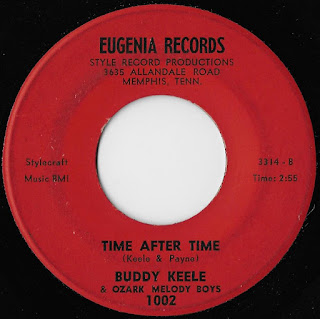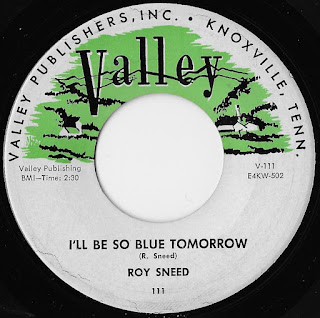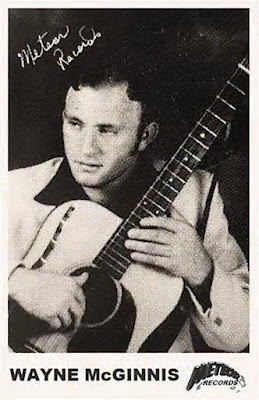Although Dave Denney had an extensive career as a recording artist, he was never rewarded with a real hit recording. He started his career in the 1930s, began recording in the mid 1940s and was still a radio personality some twenty years later. He is largely forgotten today and I must admit that I had never heard of him until I purchased this piece of phenomenal RCA colored vinyl some years ago.
Denney hailed from Lafayette, Indiana, where he was born on August 25,1921, as David Karlstrand. His grandfather, Edward Karlstrand, was born in Sweden but immigrated to the United States in the 19th century and settled in Illinois. Later, the Karlstrand family moved to Indiana. David Karlstrand took a liking at music at an early age. He was inspired by the western tunes his mother sang and soon, she felt that her son needed a guitar. A local preacher got word of that and not long after, he was presented with his first six-string.
By the time he was 15 years old, he performed with a band called the Texas Cowboys, led by Rube Tronson, and it is likely that he adapted the stage name "Dave Denney" around that time. Tronson's Texas Cowboys played various venues such as theaters, dances, rodeos, fairs and were also heard on such stations as WSAU in Warsau, Wisconsin or the famed WLS in Chicago (also appearing on the National Barn Dance). The sudden death of Tronson in 1939 disbanded the band and Denney set out on his own.
After his stint with the Texas Cowboys, Denney moved west and toured such states as Texas, Utah, California, and even Mexico. I have found no hint but it seems probable that Denney served his country between 1941 and 1945. At least, I did not find any mention of him in magazines during this time frame. However, he was back in music business in the northern states by summer 1945, as Billboard noted on June 16: "Dave Denney, formerly with Rube Tronson's hillbilly band over WLS, is currently doing a single at the Mayfair Club, Boston." Later that year, he became a performer on WHN in New York City.
 |
| Bilboard February 9, 1946 |
By late 1945, Denney had signed a recording contract with New York City based Musicraft Records and his first recordings saw release in December that year, "It's Nobody's Fault But Your Own" b/w "Careless Love" (Musicraft #15049). His backing band on the Musicraft sessions featured famous black jazz violinist Eddie South. Denney remained with Musicraft for about a year and afterwards, switched to the Signature label for two releases in July 1947. While recording for Musicraft, Denney had begun writing songs and was under contract with Leeds Publishing. He composed many of his recorded works and also other artists cut his songs, including Pee Wee King (with whom Denney also recorded as a vocalist in King's band).
 |
| Dave Denney RCA-Victor promo picture, 1948 or 1949 |
By 1948, Denney had appeared on nationally syndicated shows on CBS and ABC, when he joined the staff of KVOO in Tulsa, Oklahoma, moving from the north to the midwest. Already in early 1948, his first RCA-Victor disc had appeared, "I'm Waltzing with a Broken Heart" b/w "Part of My Heart is Missing" (RCA-Victor #20-2726). Denney would stick with RCA for the rest of the decade, the last for him being today's selection, "My Bucket's Got a Hole In It" and "I Gotta Have My Baby Back."
Both were recorded at RCA's studio in New York City on November 2, 1949, with an unknown line-up and saw release shortly afterwards on both 78 and 45rpm format. However, none of Denney's singles created sales figures that animated RCA to keep Denney on its roster.
 |
| Billboard December 24, 1949, C&W review |
In June 1949, Denney had signed a three-year contract with Chicago's WLS radio. After his stint with KVOO, he had worked at a station in Washington and then moved to Chicago. By early 1953, he was a DJ at WPTR in Troy, New York, where he would spent the following years.
After a four year break from recording, Denney returned to a recording studio in August 1954, cutting four songs for MGM Records. The label signed him around September and his first release for the label, "Cry, Fool Cry" b/w "Stop, You're Breaking My Heart" (MGM #K11831) appeared in October. A second single followed but success eluded him and it remained Denney's only session for the label. He would not record again until the mid 1960s, cutting a single for Golden Crest, and waxing his last sides later that decade for the Viking label.
During the 1960s, Denney worked with different radio stations in New York State, mostly as a DJ . He teamed up with Anna Marie Thomas for both personal and radio performances during these years. In 1960, he spun platters over WROW in Albany, New York, and Billboard reported that the pair of Denney and Thomas joined WLEE in Glendale, New York, around June 1963. By 1965, both were featured performers on WXKW, also New York State.
Dave Denney died August 1, 1972, at the young age of 50 years. The British Archive of Country Music has released a 27 tracks CD of Denney's 1940s and 1950s recordings in 2009. It has since remained the only reissue of his recorded works.



























